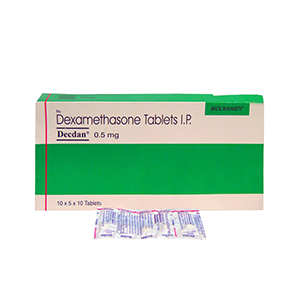
We accept Bitcoins
Get 10% discount!!!
Dexamethasone

The image may differ from the actual product
Dexamethasone is used to treat conditions such as arthritis, blood/hormone/immune system disorders, allergic reactions, certain skin and eye conditions, breathing problems, certain bowel disorders, and certain cancers. It is also used as a test for an adrenal gland disorder (Cushing's syndrome).
Manufacture: Wockhardt Ltd
USES
Dexamethasone is used to treat conditions such as arthritis, blood/hormone/immune system disorders, allergic reactions, certain skin and eye conditions, breathing problems, certain bowel disorders, and certain cancers. It is also used as a test for an adrenal gland disorder (Cushing's syndrome).
This medication is a corticosteroid hormone (glucocorticoid). It decreases your body's natural defensive response and reduces symptoms such as swelling and allergic-type reactions.
HOW TO USE DEXAMETHASONE
Take this medication by mouth as directed by your doctor. Take with food or milk to prevent stomach upset. Take this medication by mouth with a full glass of water (8 ounces/240 milliliters) unless your doctor directs you otherwise. If you are using the liquid form of the medication, use a medication-measuring device to carefully measure the prescribed dose. Do not use a household spoon.
If you take this medication once daily, take it in the morning before 9 AM. If you are taking this medication every other day or on another schedule besides a daily one, it may help to mark your calendar with a reminder.
The dosage and length of treatment are based on your medical condition and response to therapy. Your doctor may attempt to reduce your dose slowly from time to time to minimize side effects.
Use this medication regularly in order to get the most benefit from it. To help you remember, take it at the same time(s) each day. Keep taking this medication even if you feel well. Follow the dosing schedule carefully, and take this medication exactly as prescribed.
Do not stop taking this medication without consulting your doctor. Some conditions may become worse when this drug is suddenly stopped. Your dose may need to be gradually decreased.
Inform your doctor if your condition does not improve or worsens.
SIDE EFFECTS
Stomach upset, headache, dizziness, menstrual changes, trouble sleeping, increased appetite, or weight gain may occur. If any of these effects persist or worsen, notify your doctor or pharmacist promptly.
Remember that your doctor has prescribed this medication because he or she has judged that the benefit to you is greater than the risk of side effects. Many people using this medication do not have serious side effects.
Tell your doctor right away if any of these unlikely but serious side effects occur: signs of infection (e.g., fever, persistent sore throat), bone/joint pain, increased thirst/urination, fast/slow/irregular heartbeat, eye pain/pressure, vision problems, heartburn, puffy face, swelling of the ankles/feet, symptoms of stomach/intestinal bleeding (such as stomach/abdominal pain, black/tarry stools, vomit that looks like coffee grounds), pain/redness/swelling of arms/legs, tiredness, mental/mood changes (e.g., depression, mood swings, agitation), unusual hair/skin growth, muscle pain/cramps, weakness, easy bruising/bleeding, slow wound healing, thinning skin, seizures.
PRECAUTIONS
Before taking Dexamethasone, tell your doctor or pharmacist if you are allergic to it, or to other corticosteroids (e.g., prednisone); or if you have any other allergies. This product may contain inactive ingredients, which can cause allergic reactions or other problems. Talk to your pharmacist for more details.
Before using this medication, tell your doctor or pharmacist your medical history, especially of: infections (e.g., tuberculosis, herpes, fungal infections), kidney disease, liver disease, mental/mood conditions (e.g., psychosis, anxiety, depression), low blood minerals (e.g., low potassium/calcium), thyroid disease, stomach/intestinal problems (e.g., ulcer, ulcerative colitis, diverticulitis, unexplained diarrhea), high blood pressure, heart problems (e.g., congestive heart failure, recent heart attack), diabetes, eye diseases (e.g., cataracts, glaucoma, herpes infection of the eye), brittle bones (osteoporosis), history of blood clots.
This medication may mask signs of infection or put you at greater risk of developing very serious infections. Report any injuries or signs of infection (e.g., persistent sore throat/fever/cough, pain during urination, muscle aches) that occur during treatment.
OVERDOSE
If someone has overdosed and has serious symptoms such as passing out or trouble breathing, call 911. Otherwise, call a poison control center right away.
NOTES
Do not share this medication with others.
If this medication is used for an extended time, laboratory and/or medical tests (e.g., blood sugar/mineral levels, blood pressure, eye exams) should be performed periodically to monitor your progress or check for side effects. Consult your doctor for more details.
Talk to your doctor about making changes to your lifestyle that may decrease the side effects of this medication (such as doing weight-bearing exercise, making dietary changes including controlling salt intake and getting more potassium/calcium).
MISSED DOSE
If you are taking this medication daily and on a regular schedule, and you miss a dose, take it as soon as you remember. If it is near the time of the next dose, skip the missed dose. Take your next dose at the regular time. Do not double the dose to catch up.
If you are taking this medication every other day or are slowly reducing your dose, and you miss a dose, then contact your doctor or pharmacist right away to establish a new dosing schedule.
STORAGE
Store this medication at room temperature away from light and moisture. Do not store it in your bathroom. Keep all medications away from children and pets.
Do not flush medications down the toilet or pour them into a drain unless instructed to do so. Properly discard this product when it is expired or no longer needed. Consult your pharmacist or local waste disposal company.

 English
English 









